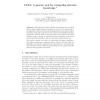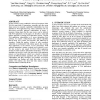46 search results - page 4 / 10 » Computational Soundness of Formal Indistinguishability and S... |
RTA
2009
Springer
14 years 2 months ago
2009
Springer
Reasoning about the knowledge of an attacker is a necessary step in many formal analyses of security protocols. In the framework of the applied pi calculus, as in similar languages...
SEFM
2007
IEEE
14 years 1 months ago
2007
IEEE
We give a formal account of a calculus for modeling service-based systems, suitable to describe both service composition (orchestration) and the protocol that services run when in...
WWW
2004
ACM
14 years 8 months ago
2004
ACM
Security remains a major roadblock to universal acceptance of the Web for many kinds of transactions, especially since the recent sharp increase in remotely exploitable vulnerabil...
SAS
2007
Springer
14 years 1 months ago
2007
Springer
Variables in programs are usually confined to a fixed number of bits and results that require more bits are truncated. Due to the use of 32-bit and 64-bit variables, inadvertent ...
TLDI
2009
ACM
14 years 4 months ago
2009
ACM
Type-and-effect systems are a natural approach for statically reasoning about a program’s execution. They have been used to track a variety of computational effects, for example...


